Is traditional classroom instruction limiting students’ potential? Are there more effective ways to engage and empower learners?
Student-centered learning approaches have revolutionized education by shifting the focus from teacher-led instruction to empowering learners to take ownership of their academic and personal growth. This approach recognizes that each student is unique and promotes personalized learning experiences that cater to individual needs and interests.
At Canada Global Academy, we believe in the transformative power of student-centered education. Through our School Partnership Program, we are revolutionizing schools by implementing student-centered approaches that nurture student empowerment, ignite curiosity, and foster a love for lifelong learning.
In this article, we will explore how student-centered methods, such as personalized learning, active learning, and individualized instruction, can empower students and create meaningful educational experiences. We will also delve into global trends reshaping 21st century learning and the importance of fostering inclusive communities.
Get ready to challenge conventional beliefs and discover how student-centered education can unlock the full potential of every learner.
Contents
- 1 Global Trends Reshaping 21st Century Learning
- 2 Unlocking Potential Through Personalized Learning
- 3 Game-Based Learning Engages Modern Students
- 4 Applying Learning Through Experiential Education
- 5 Integrating Social-Emotional Development
- 6 Global Citizenship Via Language Learning
- 7 Building Critical Thinking Abilities
- 8 Fostering Inclusive Communities
- 9 Exploring Innovative Student-Centric Pedagogies
- 10 Adapting Curriculum to Diverse Learning Styles
- 11 FAQ
- 11.1 What is student-centered learning?
- 11.2 How does student-centered learning empower students?
- 11.3 What is personalized learning?
- 11.4 How does game-based learning enhance student engagement?
- 11.5 What is experiential education?
- 11.6 How does social-emotional development support student-centered approaches?
- 11.7 How does language learning contribute to global citizenship?
- 11.8 How does student-centered education foster critical thinking?
- 11.9 How does inclusive education support student-centered approaches?
- 11.10 How can teachers explore innovative student-centric pedagogies?
- 11.11 How does curriculum adaptation benefit diverse learning styles?
- 12 Source Links
Key Takeaways:
- Student-centered learning approaches empower students to take ownership of their learning journey.
- Personalized learning promotes engagement, creativity, and meaningful self-learning experiences.
- Global trends in education, such as technology integration and future-ready skills, are reshaping 21st century learning.
- Experiential education and game-based learning engage students through hands-on and interactive experiences.
- Integrating social-emotional development and promoting global citizenship are essential in student-centered education.
Global Trends Reshaping 21st Century Learning
The landscape of education is evolving rapidly, driven by global trends that are reshaping 21st century learning. These trends include:
- The Integration of Technology in Education: Technology has become an integral part of the modern classroom, providing students with access to vast amounts of information, interactive learning experiences, and collaborative tools. From interactive whiteboards to online learning platforms, technology is revolutionizing how students learn and educators teach.
- The Emphasis on Future-Ready Skills: The demands of the 21st century workforce require individuals to possess a range of skills beyond academic knowledge. Future-ready skills such as critical thinking, problem-solving, creativity, collaboration, and adaptability are becoming increasingly important. Schools are adapting their curriculum and instructional methods to develop these skills in students.
- The Promotion of Global Citizenship: In an interconnected world, fostering global citizenship is crucial. Global citizenship education aims to develop students’ understanding of the world, their appreciation for diverse cultures, and their sense of social responsibility. It encourages students to become active global citizens who are aware of global issues and take action to make a positive impact.
Educators around the globe are embracing these trends to create learning environments that prepare students for success in the digital age and develop their future-ready skills. By incorporating technology into education, emphasizing the acquisition of future-ready skills, and promoting global citizenship, schools are equipping students with the knowledge, competencies, and mindset necessary to thrive in a rapidly changing world.
Unlocking Potential Through Personalized Learning
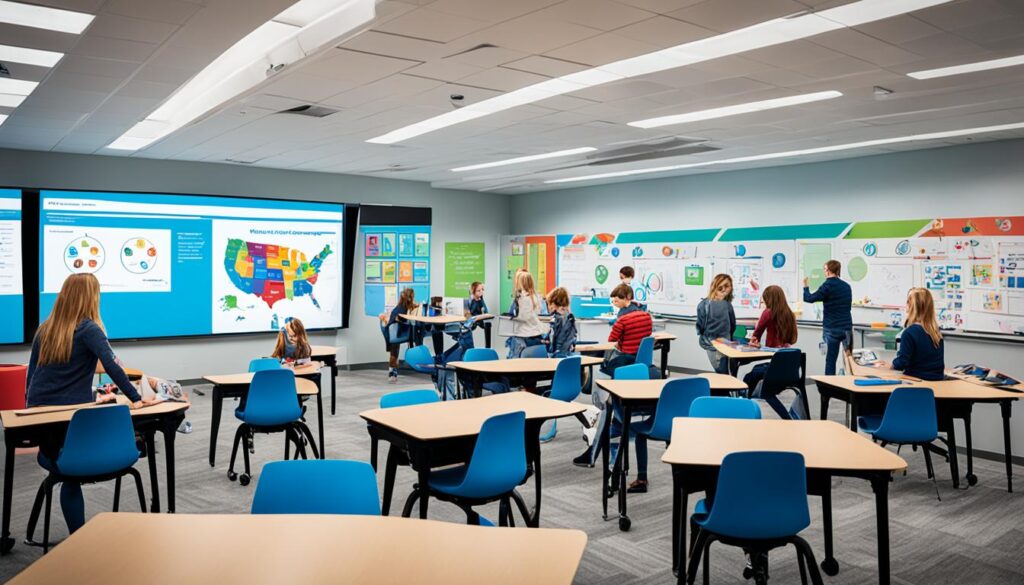
Personalized learning is a powerful approach that recognizes the unique needs and interests of each student. It goes beyond traditional one-size-fits-all instruction and embraces tailored learning experiences that empower students to take ownership of their education.
By customizing learning pathways and utilizing individualized instruction techniques, educators create a student-centered environment that promotes engagement and empowers students to thrive. This approach acknowledges that every learner is different and requires flexible teaching techniques to support their diverse needs.
Adaptive learning approaches play a crucial role in personalized learning, ensuring that students receive the right level of challenge and support. These approaches allow students to progress at their own pace and provide targeted interventions when needed, ensuring no student is left behind.
In personalized learning environments, students are actively involved in their education. They have the freedom to explore their interests and pursue topics that resonate with them. This empowerment fosters a deep sense of student agency and motivation, resulting in enhanced learning outcomes.
Canada Global Academy’s School Partnership Program is at the forefront of personalized learning. Through their innovative approach, they are redefining education by creating tailored learning environments that foster student empowerment and engagement. To learn more about Canada Global Academy’s School Partnership Program, visit https://canadaglobalacademy.com/school-partnership-program/.
Game-Based Learning Engages Modern Students
Game-based learning is an innovative approach that utilizes games and interactive activities to engage and motivate students. By incorporating elements of gamification into education, educators can create immersive and interactive learning experiences that promote student engagement and enhance learning outcomes. Game-based learning capitalizes on students’ natural inclination towards play and allows them to apply their knowledge and skills in a fun and engaging manner.
With the integration of game-based learning, students become active participants in their own learning journey. They are presented with challenges, puzzles, and scenarios that require critical thinking, problem-solving, and decision-making, all of which are essential skills for success in the modern world. By connecting learning to real-life situations and making it enjoyable, game-based learning enhances student motivation, boosts their confidence, and improves their retention of information.
Moreover, game-based learning leverages interactive teaching methodologies that cater to different learning styles and preferences. It provides a multi-sensory learning experience that appeals to visual, auditory, and kinesthetic learners. Through the use of educational technology, such as simulations, virtual reality, and educational apps, students can actively engage with the content and explore concepts in a dynamic and hands-on way.
Blended learning environments, which combine traditional face-to-face instruction with online components, are particularly conducive to the implementation of game-based learning. The integration of technology allows students to access games and interactive activities both in the classroom and remotely, providing flexibility and continuity in their learning journey. By embracing game-based learning in blended learning environments, educators can maximize student engagement and create personalized learning experiences tailored to each student’s needs and interests.
Game-based learning holds immense potential in transforming education and revolutionizing the way students learn. It fosters a love for learning, encourages collaboration and problem-solving, and equips students with the skills they need to thrive in the 21st century. To explore how Canada Global Academy’s School Partnership Program is leveraging game-based learning and other student-centered approaches, visit https://canadaglobalacademy.com/school-partnership-program/.
Applying Learning Through Experiential Education
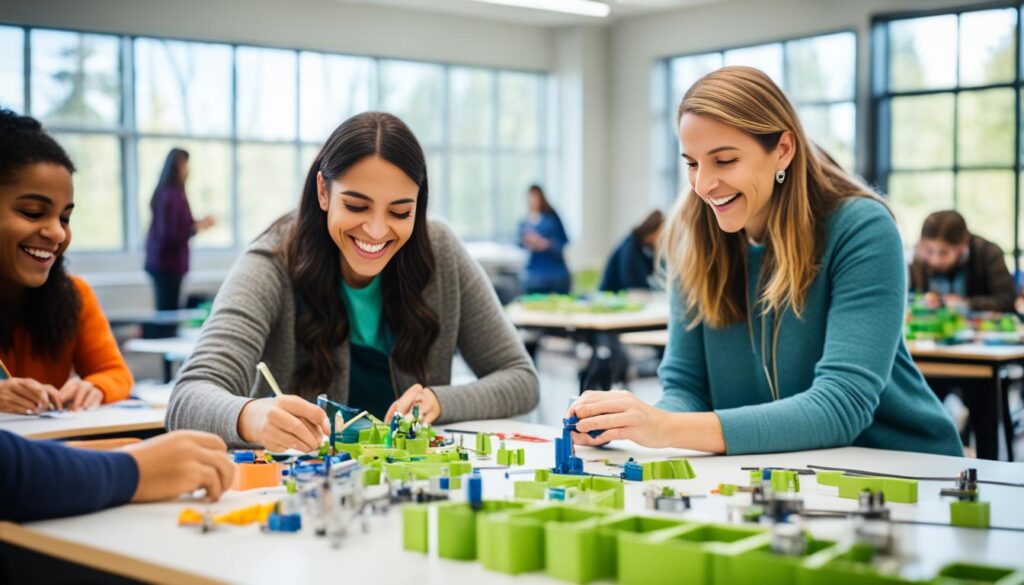
Experiential education is an immersive and hands-on approach that goes beyond traditional classroom learning. It emphasizes real-world application and problem-solving, allowing students to actively engage with their education. By providing authentic learning experiences, educators can cultivate critical thinking skills, creativity, and collaboration. Through project-based student projects and inquiry-based learning models, students have the opportunity to explore and apply their knowledge in practical contexts.
Experiential education encourages students to become active participants in their learning journey, empowering them to develop a deeper understanding of the subject matter. By tackling real-world challenges, students learn how to think critically, solve problems, and work collaboratively with their peers. This approach not only prepares students for success in the real world but also instills in them a sense of confidence and independence.
Canada Global Academy’s School Partnership Program is a prime example of how experiential education is being implemented to transform schools. The program offers innovative teaching strategies that encourage students to take an active role in their education and apply their learning to real-world scenarios. Through immersive and hands-on projects, students develop essential skills and knowledge while deepening their understanding of the subjects they study.
By embracing experiential education, educators open the door to a world of possibilities and create dynamic learning environments that foster critical thinking, problem-solving, and creativity. Students not only gain a deeper understanding of the subjects they study but also develop essential skills that will serve them well in their future endeavors.
To learn more about how Canada Global Academy’s School Partnership Program is revolutionizing schools through experiential education, visit https://canadaglobalacademy.com/school-partnership-program/.
Integrating Social-Emotional Development
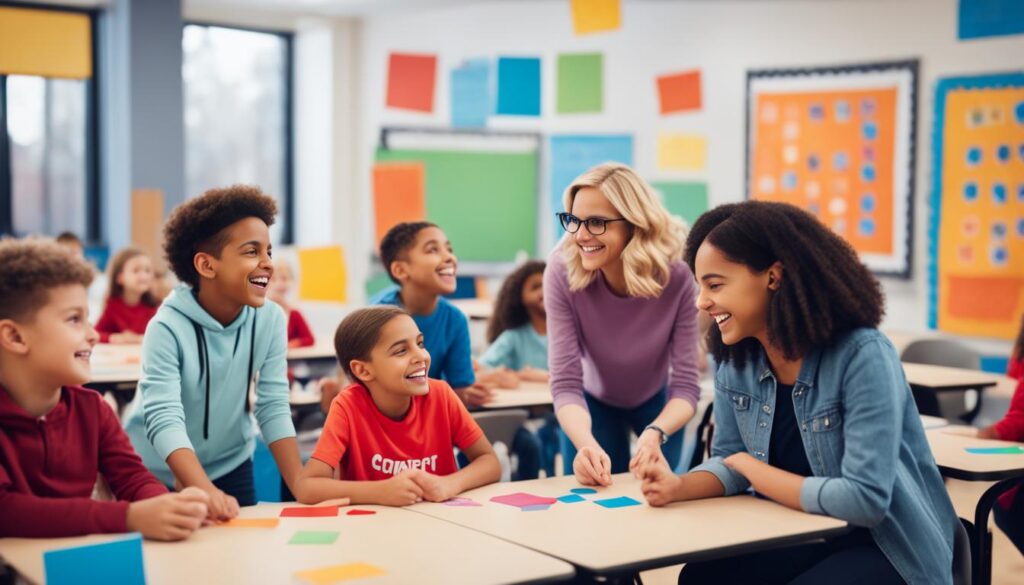
Integrating social-emotional development is a crucial aspect of student-centered approaches. By providing social-emotional learning support, educators can cultivate students’ well-being, resilience, and emotional intelligence. This holistic approach to education goes beyond academic achievement and focuses on nurturing the whole child.
One effective way to support social-emotional learning is by implementing mindfulness practices in education. Mindfulness exercises help students develop self-awareness, manage stress, and enhance their ability to focus and regulate their emotions. By incorporating mindfulness into daily classroom routines, educators create a calm and supportive environment that promotes well-being.
In student-centered approaches, it is important to prioritize student motivation strategies. When students are engaged and motivated, they are more likely to take ownership of their learning and achieve academic success. Educators can foster motivation by providing relevant and meaningful learning experiences, offering choices and autonomy in assignments, and recognizing students’ accomplishments.
Supporting student mental health is another essential component of social-emotional development. Educators play a critical role in identifying and addressing mental health concerns in students. It is important to provide resources and create a safe space for students to seek support. Collaborating with mental health professionals and implementing strategies to promote positive mental health can help students thrive academically and personally.
Additionally, student emotional intelligence training is vital in student-centered approaches. Emotional intelligence encompasses skills such as empathy, self-awareness, and effective communication. By providing opportunities for students to develop these skills, educators equip them with the tools to navigate relationships and handle conflicts, both inside and outside the classroom.
Overall, integrating social-emotional development in student-centered approaches is crucial for students’ overall well-being and success. By fostering a supportive and inclusive learning environment, educators empower students to develop the necessary skills and mindset to thrive in all aspects of life.
Global Citizenship Via Language Learning
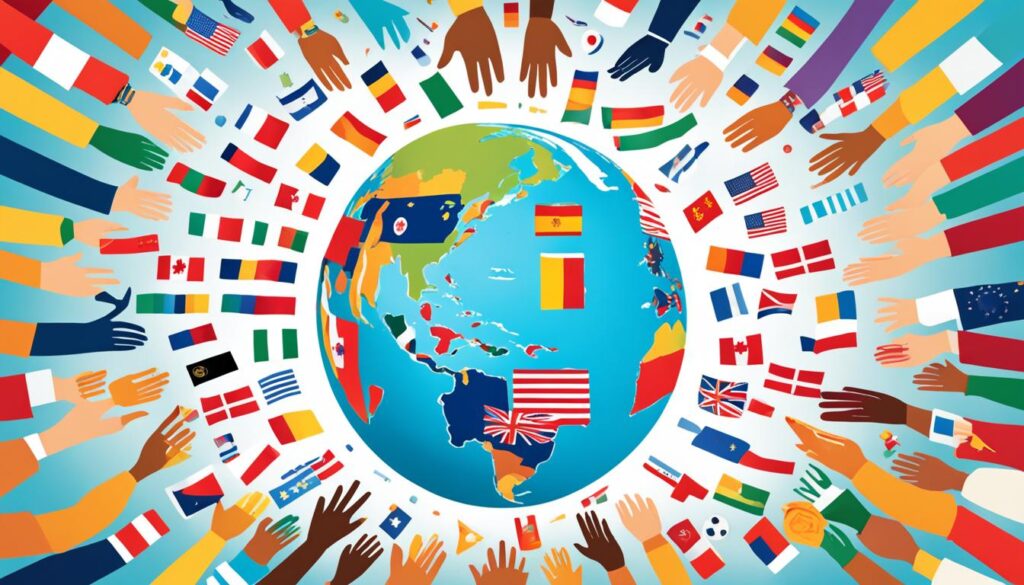
Language learning plays a pivotal role in fostering global citizenship education. By immersing students in different languages and exposing them to diverse cultures, educators can nurture global awareness, cultural understanding, and empathy. Through language learning, students develop essential communication skills, critical thinking abilities, and open-mindedness, empowering them to become active global citizens who contribute to a more interconnected world.
At Canada Global Academy, we recognize the significance of language learning in promoting global citizenship. Our culturally responsive teaching approaches and global perspectives in education create an inclusive and enriching environment for students. By integrating language learning into our curriculum, we enable students to explore and appreciate diverse cultures, fostering a sense of global interconnectedness and empowering them to engage with the world beyond their immediate surroundings.
Whether through cultural exchange programs, student-led initiatives, or participation in global citizenship projects, language learning serves as a bridge that connects students across borders and fosters meaningful interactions. It enhances students’ global perspectives and prepares them to navigate an increasingly interconnected and diverse world.
Through language learning, students not only gain practical skills but also develop a deeper respect and appreciation for different cultures, languages, and traditions. This enables them to participate actively and responsibly in the global community, making a positive impact in their interactions and relationships.
Language learning, as a key pillar of global citizenship education, equips students with the tools and perspectives necessary to navigate an increasingly interconnected world. By embracing language learning initiatives, educators can empower students to become active global citizens who embrace diversity, promote inclusivity, and contribute meaningfully to the global community.
To learn more about how Canada Global Academy’s School Partnership Program is revolutionizing schools and fostering global citizenship through language learning, visit https://canadaglobalacademy.com/school-partnership-program/.
Building Critical Thinking Abilities
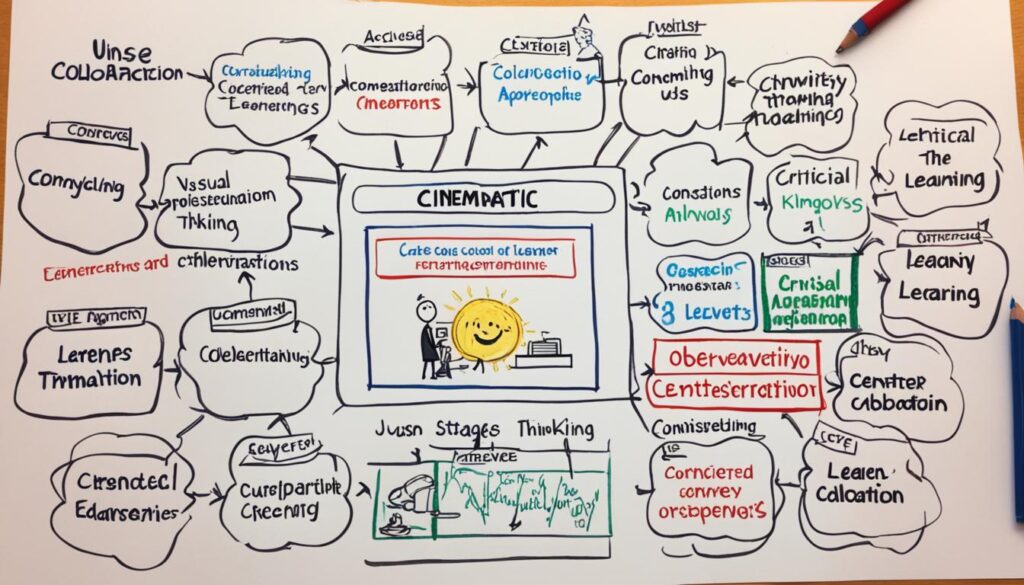
Building critical thinking abilities is a fundamental aspect of student-centered education. By incorporating problem-solving teaching strategies and inquiry-based learning models, educators can foster the development of critical thinking skills and promote deep understanding among students.
Problem-solving teaching strategies encourage students to analyze complex situations, evaluate evidence, and generate innovative solutions. This enables them to develop essential critical thinking abilities that are applicable in various contexts throughout their lives. By engaging students in real-world problems and challenges, educators provide opportunities for them to apply critical thinking skills and develop a solutions-oriented mindset.
“The formulation of a problem is often more essential than its solution.”
―Albert Einstein
Inquiry-based learning models enhance critical thinking by encouraging students to question, explore, and investigate. This approach promotes curiosity and intellectual curiosity, as students actively seek answers, analyze information, and make connections. By engaging in authentic and meaningful inquiry, students develop valuable critical thinking skills, including logical reasoning, evidence evaluation, and problem-solving.
To support the development of critical thinking abilities, scaffolded learning experiences are implemented. These experiences provide structured support and guidance, gradually transferring responsibility to the students. Educators strategically break down complex tasks into manageable steps, allowing students to build their critical thinking skills through incremental challenges and successes.
Reflective and self-assessment practices also play a crucial role in fostering critical thinking abilities. By encouraging students to reflect on their learning process, identify their strengths and areas for improvement, and set goals for growth, educators empower them to take ownership of their intellectual development. Regular opportunities for self-assessment enable students to evaluate their own thinking processes, analyze their successes and failures, and make adjustments to improve their critical thinking skills.
Furthermore, feedback-driven student growth is an essential element in building critical thinking abilities. Effective feedback from educators and peers provides students with valuable insights into their thinking processes, identifies areas for improvement, and guides them towards higher levels of critical thinking. By incorporating timely and specific feedback into the learning process, educators ensure that students understand the criteria for success and can make informed decisions to refine their thinking skills.
By integrating problem-solving teaching strategies, inquiry-based learning models, scaffolded learning experiences, reflective and self-assessment practices, and feedback-driven student growth, educators can effectively develop critical thinking abilities in their students. These skills empower students to become independent and analytical thinkers, equipping them with the tools necessary for success in academic, professional, and personal endeavors.
Explore how Canada Global Academy’s School Partnership Program is revolutionizing schools. Visit https://canadaglobalacademy.com/school-partnership-program/ to learn more.
Fostering Inclusive Communities

Fostering inclusive communities is a core aspect of student-centered education. By implementing inclusive education practices and differentiated instruction methods, educators can meet the diverse needs of all students and create equitable learning environments.
One of the key elements of inclusive education is providing opportunities for student collaboration. Collaborative learning experiences give students the chance to work together, share ideas, and learn from one another. These opportunities not only enhance students’ understanding of the subject matter but also foster a sense of belonging and community within the classroom.
Another effective way to foster inclusive communities is through community-based learning projects. By connecting classroom learning to real-life situations and issues in the community, students gain a deeper understanding of the world around them and develop a stronger sense of empathy and civic responsibility.
Furthermore, incorporating student representation in governance can also contribute to the development of an inclusive school community. By involving students in decision-making processes, such as through student councils or advisory boards, educators can empower students to have a voice in shaping their educational experiences. This not only promotes a sense of ownership and agency among students, but also ensures that diverse perspectives are taken into account when making important decisions.
Overall, fostering inclusive communities is essential in creating a supportive and welcoming learning environment. By implementing inclusive education practices, offering differentiated instruction, providing student collaboration opportunities, engaging in community-based learning projects, and promoting student representation in governance, educators can cultivate an inclusive culture where every student feels valued, respected, and empowered.
Exploring Innovative Student-Centric Pedagogies
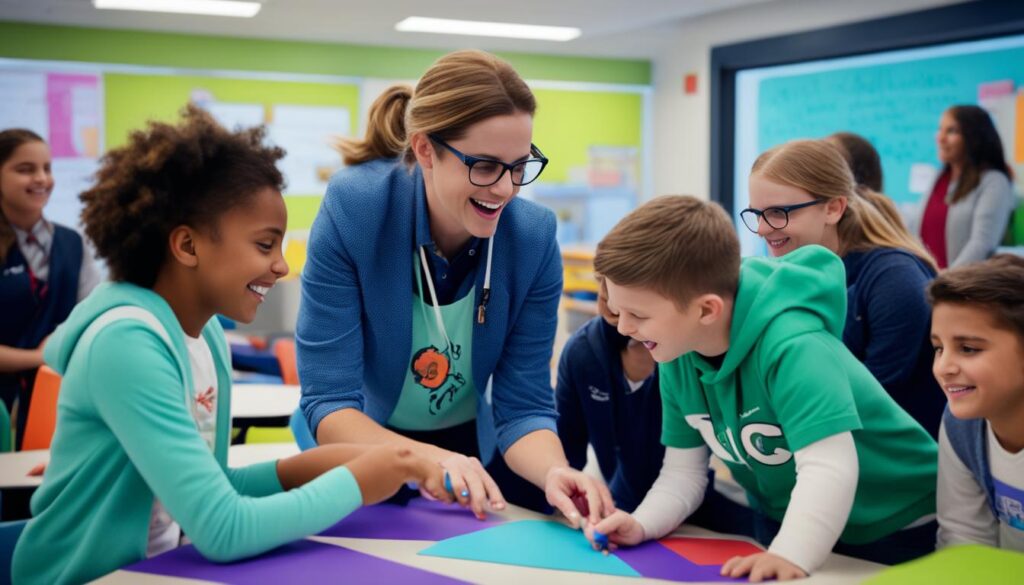
Exploring innovative student-centric pedagogies involves embracing new teaching methods and approaches that prioritize active student engagement and collaboration. By incorporating these innovative techniques, educators can create dynamic and interactive learning environments that empower students to take ownership of their education.
Collaborative student projects provide opportunities for students to work together, fostering teamwork, communication, and problem-solving skills. These projects encourage students to apply their knowledge and creativity to real-world scenarios, preparing them for the challenges they will face in their future careers.
Additionally, student innovation competitions offer a platform for students to showcase their ideas and inventions. These competitions not only promote critical thinking and innovation but also provide valuable opportunities for students to gain recognition and pursue their entrepreneurial aspirations.
Furthermore, student entrepreneurship programs empower students to develop entrepreneurial mindsets and skills. These programs nurture students’ creativity and strategic thinking, equipping them with the tools they need to succeed in today’s rapidly changing world.
Implementing these student-centric pedagogies fosters a culture of innovation and creativity in the classroom. By inspiring students to think critically, collaborate, and explore their passions, educators can nurture the next generation of innovators, problem solvers, and entrepreneurs.
Canada Global Academy's School Partnership Program
Explore how Canada Global Academy’s School Partnership Program is revolutionizing schools. Visit https://canadaglobalacademy.com/school-partnership-program/ to learn more.
Adapting Curriculum to Diverse Learning Styles
In student-centered education, adapting the curriculum to diverse learning styles is essential for fostering inclusive and engaging learning environments. Each student has unique needs, preferences, and strengths, and by recognizing and accommodating these differences, educators can ensure that every student has the opportunity to thrive and succeed.
Differentiated instruction allows teachers to tailor their teaching methods and materials to match students’ learning styles. This approach acknowledges that students learn in different ways, such as visual, auditory, or kinesthetic. By incorporating a variety of instructional strategies and resources, educators can ensure that all students are actively engaged and able to comprehend and apply the curriculum.
Individualized student instruction takes differentiation a step further by considering each student’s specific abilities, interests, and goals. This personalized approach allows educators to create tailored learning experiences that resonate with students on a deeper level. Through individualized instruction, students can explore their passions, develop their strengths, and address any areas of challenge or growth.
Adaptive teaching techniques are another valuable tool for adapting the curriculum to diverse learning styles. These techniques involve continuously monitoring and assessing students’ progress and adjusting instruction accordingly. By gathering feedback, observing student performance, and employing flexible teaching strategies, educators can ensure that each student receives the right level of support and challenge.
By embracing curriculum adaptation, different learning styles, differentiated instruction, individualized student instruction, tailored learning experiences, and adaptive teaching techniques, educators can create a truly student-centered learning environment. This approach celebrates the uniqueness of every learner and empowers students to engage, excel, and reach their full potential.
FAQ
What is student-centered learning?
Student-centered learning is an educational approach that prioritizes the needs and interests of individual students. It shifts the focus from teacher-led instruction to empowering students to take ownership of their learning and growth.
How does student-centered learning empower students?
Student-centered learning empowers students by promoting active engagement, collaboration, and creativity in the classroom. It allows students to have a voice in their education and encourages them to become active participants in their learning journey.
What is personalized learning?
Personalized learning is an approach that recognizes the unique needs and interests of each student. It involves tailoring instruction to individual learners, creating customized learning pathways, and employing flexible teaching techniques to meet students’ diverse needs.
How does game-based learning enhance student engagement?
Game-based learning integrates elements of gamification into education to create interactive and immersive learning experiences. It leverages educational technology and blended learning environments to engage and motivate students, ultimately enhancing their overall engagement and learning outcomes.
What is experiential education?
Experiential education is a hands-on approach that emphasizes real-world application and problem-solving. By engaging students in authentic learning experiences, such as project-based student projects and inquiry-based learning, it fosters critical thinking, creativity, and collaboration.
How does social-emotional development support student-centered approaches?
Social-emotional development support, including mindfulness practices and mental health support, cultivates students’ well-being, resilience, and emotional intelligence. This support creates a positive and supportive classroom environment, promoting student motivation and success in all aspects of life.
How does language learning contribute to global citizenship?
Language learning exposes students to diverse cultures and fosters global awareness and understanding. It promotes communication skills, critical thinking, and open-mindedness, empowering students to become active global citizens who contribute to a more interconnected world.
How does student-centered education foster critical thinking?
Student-centered education integrates problem-solving teaching strategies and inquiry-based learning models, which develop critical thinking skills. Scaffolded learning experiences, reflective practices, and feedback-driven growth support the development of independent and analytical thinkers.
How does inclusive education support student-centered approaches?
Inclusive education practices and differentiated instruction methods enable educators to meet the diverse needs of all students and create equitable learning environments. Student collaboration opportunities and community-based projects foster a sense of belonging and empower students to embrace diversity.
How can teachers explore innovative student-centric pedagogies?
Teachers can explore innovative pedagogies by incorporating collaborative student projects, innovation competitions, and entrepreneurship programs. These opportunities inspire students to think critically, solve real-world problems, and develop essential 21st-century skills.
How does curriculum adaptation benefit diverse learning styles?
Curriculum adaptation involves employing differentiated instruction and individualized student instruction to meet the unique needs and preferences of students. It ensures tailored learning experiences, adaptive teaching techniques, and personalized support to facilitate every student’s success and growth.
Source Links
- https://www.lighthouse-learning.com/empowering-students-through-student-centred-learning-approaches.html
- https://www.teachhub.com/teaching-strategies/2020/07/student-centered-learning-strategies/
- https://medium.com/@ancyfrancis/embracing-student-centered-learning-empowering-students-for-success-d367d731c00b

Education Disruptor proudly collaborates with leading innovators in the education sector who share our passion for reshaping K12 education. We extend our sincere gratitude to the following organizations for their support. Ethos Education in collaboration with Canada Global Academy who are the exclusive authorized provider of the 3rd globally ranked Ontario Ministry of Education‘s renowned K12 curriculum and Digital Learning Platform outside of Canada.
Through their School Partnership Program, they empower schools worldwide to attain Canadian Accreditation, providing the opportunity to establish themselves as Canadian Accredited schools. Additionally, home-based businesses can run their own Canadian Accredited Micro-School. Contact them today to learn more!


